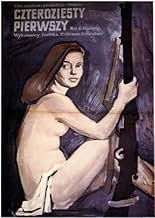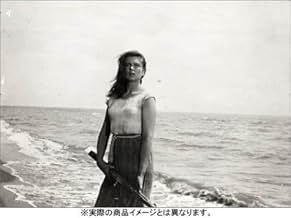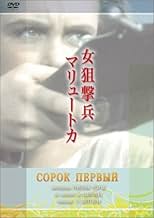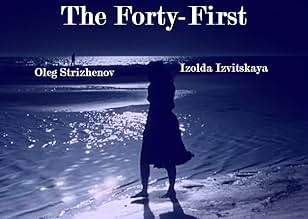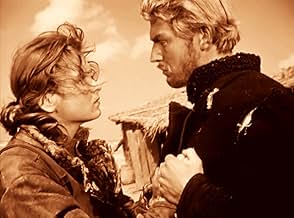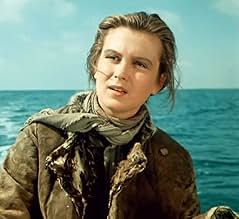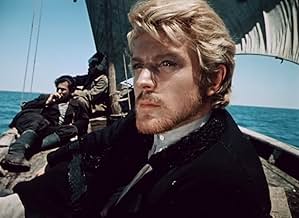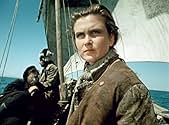IMDb RATING
7.5/10
1.8K
YOUR RATING
An unexpected romance occurs for a female Red Army sniper and a White Army officer.An unexpected romance occurs for a female Red Army sniper and a White Army officer.An unexpected romance occurs for a female Red Army sniper and a White Army officer.
- Director
- Writers
- Stars
- Awards
- 1 win & 1 nomination total
Nikolai Dupak
- Soldier Andrei Chupilko
- (as N. Dupak)
Georgi Shapovalov
- Soldier Terentyev
- (as G. Shapovalov)
Lev Kovylin
- Soldier Kovylin
- (as L. Kovylin)
Yuriy Romanov
- Soldier Vyakhir
- (as Yu. Romanov)
Daniil Netrebin
- Soldier Semyannin
- (as D. Netrebin)
Asanbek Umuraliyev
- Soldier Umankul
- (as A. Umuraliev)
Anatoli Kokorin
- Soldier Yegorov
- (as A. Kokorin)
Vadim Sinitsyn
- Wounded soldier
- (as V. Sinitsyn)
Kirey Zharkimbayev
- Timerkul
- (as K. Zharkimbayev)
- Director
- Writers
- All cast & crew
- Production, box office & more at IMDbPro
Featured reviews
wise use of close-up.wonderful images. pure poetry. a special vision about war and love. all of that makes it more than propaganda tool but an impressive expression of profound art. it is a film about values and beauty, choices and ideals. realistic, cruel, full of subtle symbols - the desert, the isle -, mark of a great director and science of nuances from two impressive actors. the story is only basic point for respect the ideological commands. but the skin of this nucleus has the rare virtue to make it more than piece of a period. the final dialog between lovers , the end, the boat in storm and near the isle, each is a precious ingredient for an universal message about duty and choices, far to basic triumphal message of regime.
Grigori Chukhrai's film, The Forty First, sets itself up to be understood as a mythic series of events; the opening scene's churning waves seem to take the viewer away to a different world and the narration sets the story in the post-Revolutionary Civil War. This narration gives the effect of a story being told, and the way the landscape is portrayed creates an unreal landscape. The colors always seem too saturated and the sky hangs close and heavy over the actors, giving the appearance of a fish bowl. Maryutka's inclusion in the plot attests to the Bolshevik ideal of gender equality, making a break with Stalinism's reinstatement of traditional gender roles; her being referred to as an "Amazon" enhances the mythic quality of the film. Chukhrai consciously constructs shots that juxtapose; the scene of Maryutka and the White Army lieutenant walking separate on the beach contrasts the two in space as they both walk in different points of the frame in different directions. The final scenes are obviously ideological: the dialogue is crafted as a metaphor for Tsarist Russia and Communist Russia, with the lieutenant (Tsarism) pleading Maryutka (Communism) to return to how they were before the fighting; the officer's dangling cross necklace is an ever-present symbol of Imperial Russia, designating that even when all visual indicators of partisanship are gone (as he and Maryutka's uniforms have been destroyed by the elements), there is still an irreconcilable difference present. The last scene illustrates the valuation of duty over emotions. Besides the smartly handled ideology, the visual effects are The Forty First's strengths. The color palette and the contrasts it creates are striking, and create a hazy, dreamlike world in which a legend is played out.
This is a very nice story, love and war story. This is a war movie without violence. In all the movie you see only three shoots. A great end for a great movie. It shows that war films can be done without blood everywhere.
An outstanding piece of work, great color and lighting, straight forward story without the usual Hollywood junket attached proving again the skill of Soviet cinema making; very good ending.
9Fpi
Much can be said about the range of emotions found in today's movies. They've certainly become better at promoting a cool atmosphere, adrenaline rushes, making plots that are cleverly built up to a climax, and fitting in as many square centimetres of skin as possible into the film. Some emotions are, however, totally, and I mean totally, disregarded. Intense melancholy, an intense sense of longing and sensations of intense pity for the characters are now nowhere to be found. This movie has all of that in spades, making it radically different from today's European and American movies. It is more "theatrical" than today's more "realistic" films, but for God's sake, don't let that put you off. An incessantly beautiful soundtrack sweeps through the entire film, and the pictures are stunningly beautiful, though in a Russian way that can simply be labelled "different". This film was an eye-opener to the fact that I've seen so many movies that ultimately have left me nearly indifferent to the fate of the characters, and to some loose theory that melancholy and pity are closely related. Everyone should hunt this movie down. The ending will haunt you forever. Anything you watch afterwards will seem like ridiculous attempts to give you cheap thrills.
Did you know
- ConnectionsFeatured in Fejezetek a film történetéböl: A szovjet film 1953-1970 (1990)
- How long is The Forty-First?Powered by Alexa
Details
- Release date
- Country of origin
- Language
- Also known as
- The Forty-First
- Filming locations
- Mosfilm Studios, Moscow, Russia(Studio)
- Production company
- See more company credits at IMDbPro
Contribute to this page
Suggest an edit or add missing content


